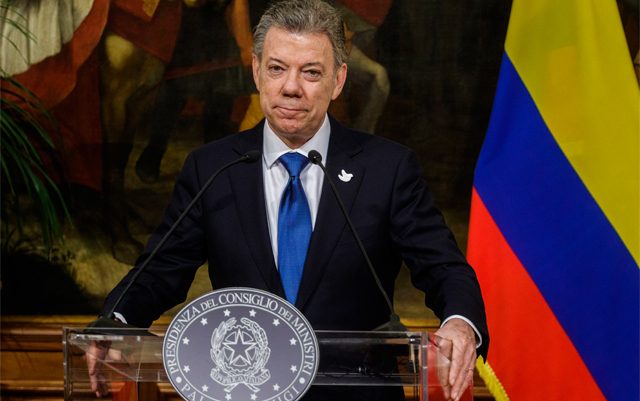Colombian President Juan Manuel Santos has been a very vocal critic of the worldwide war on drugs, going so far as to rail against it during the speech he made in acceptance of the Nobel Peace Prize in 2016, saying the way that the “war against drugs is being waged is equally or perhaps even more harmful than all the wars the world is fighting today, combined.”
As he prepares to leave office next week, President Santos has again garnered attention for his opposition to the way the war on drugs has been fought over the last 100+ years, penning an op-ed for Americas Quarterly, in which he calls the drug war a “cure that has been worse than the disease.”
“In the world, and particularly in Colombia, we invest billions of dollars a year chasing the dream of a drug-free world,” Santos wrote. “In the last 10 years, for example, we have eradicated about 2.5 million acres of coca through aerial and manual spraying. Still, according to UNODC statistics for 2016, 361,000 acres remain under cultivation. Colombian authorities have made more than 1 million drug seizures since 1993. While such figures demonstrate Colombia’s efforts to fight drug trafficking, they also show we’re on a stationary bicycle, spinning our wheels instead of moving forward.
“The policy prescription we have used for years, based mainly on punitive repression, has not solved the problem. We must look for an alternative course of treatment. We cannot insist on a strategy that focuses on repression of small peasant producers and consumers — the weakest links in the drug trafficking chain.”
Santos says that we must admit that there will always be drug users and that combating that should be a “matter of public health, not law enforcement.”
Few have seen the war on drugs from the perspective that President Santos has had over the last 8 years. He is a respected world leader whose opinions carry serious weight, especially in Central and South America.
“It is time we talk about responsible government regulation, look for ways to cut off the drug mafias’ air supply, and tackle the problems of drug use with greater resources for prevention, care and harm reduction with regard to public health and the social fabric,” Santos said near the end of his piece. He called for a global effort in this area; one that he thinks will produce much better results than what we have seen.
In many ways, a new policy path couldn’t do much worse than the current one.






